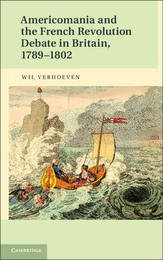
|
Americomania and the French Revolution Debate in Britain, 1789-1802
Hardback
Main Details
| Title |
Americomania and the French Revolution Debate in Britain, 1789-1802
|
| Authors and Contributors |
By (author) Wil Verhoeven
|
| Physical Properties |
| Format:Hardback | | Pages:397 | | Dimensions(mm): Height 235,Width 158 |
|
| Category/Genre | British and Irish History
Social and political philosophy |
|---|
| ISBN/Barcode |
9781107040199
|
| Classifications | Dewey:172.1094109033 |
|---|
| Audience | | Professional & Vocational | |
|---|
| Illustrations |
7 Plates, color; 6 Maps; 21 Halftones, unspecified
|
|
Publishing Details |
| Publisher |
Cambridge University Press
|
| Imprint |
Cambridge University Press
|
| Publication Date |
12 November 2013 |
| Publication Country |
United Kingdom
|
Description
This book explores the evolution of British identity and participatory politics in the 1790s. Wil Verhoeven argues that in the course of the French Revolution debate in Britain, the idea of 'America' came to represent for the British people the choice between two diametrically opposed models of social justice and political participation. Yet the American Revolution controversy in the 1790s was by no means an isolated phenomenon. The controversy began with the American crisis debate of the 1760s and 1770s, which overlapped with a wider Enlightenment debate about transatlantic utopianism. All of these debates were based in the material world on the availability of vast quantities of cheap American land. Verhoeven investigates the relation that existed throughout the eighteenth century between American soil and the discourse of transatlantic utopianism: between America as a physical, geographical space, and 'America' as a utopian/dystopian idea-image.
Author Biography
Wil Verhoeven is Chair of the American Studies Department and Professor of American Culture and Cultural Theory at the University of Groningen, and is Visiting Scholar in the American Studies Department at Brown University, Rhode Island. He is the author of Gilbert Imlay: Citizen of the World (2008), and the editor of Revolutionary Histories: Transatlantic Cultural Nationalism, 1775-1815 (2002), Epistolary Histories: Letters, Fiction, Culture (with Amanda Gilroy, 2000) and Revolutions and Watersheds: Transatlantic Dialogues, 1775-1815 (with Beth Dolan, 1999). He previously served as the Associate Dean for Education in the School of Humanities at the University of Groningen. He was the inaugural Charles H. Watts II Professor in the History of the Book and Historical Bibliography, an endowed visiting professorship at the John Carter Brown Library and Department of English, Brown University (2002-3).
Reviews'Wil Verhoeven makes a strong and original argument, that the idea of 'America' played a central, neglected role in Britain's debate on the French Revolution in the 1790s. Despite the loss of the colonies in the American Revolution, America continued to loom large in the British national imaginary. Verhoeven's readings of familiar and obscure texts are consistently rewarding. His analyses of the new world degeneracy thesis of Buffon et al.; the 'progressive agrarianism' of Crevecoeur, Jefferson, and Imlay; and the Jacobin novel are fresh and insightful; and his rehabilitation of the anti-Jacobin novel brings to the fore a neglected but 'historically significant body of social critique'. No previous writer has put these texts into conversation, and the interpretative results are striking. The debate over the French Revolution will never look quite the same.' Peter S. Onuf, University of Virginia 'Wil Verhoeven argues that participants in the 1790s debates between the so-called Jacobins and anti-Jacobins in Britain, triggered by the French Revolution, employed the issue of emigration to America as a vehicle to promote their political ideologies - the former to campaign for reforms and the latter to preserve the status quo. In the process, the Jacobin-leaning authors, including some land speculators, sponsored transatlantic settlements, while Tory-inclined ones warned of the dangers of laborer emigration, and invoked earlier sentiments hostile to the American Revolutionary republicanism. This is an innovative and worthy approach, and Verhoeven's analysis of emigration and anti-emigration literature reveals many new angles in the political and cultural history of this era. It also throws fresh light on the impact of the American Revolution on this debate. Verhoeven's work offers a significant contribution to scholarship.' Michal Jan Rozbicki, Saint Louis University
|